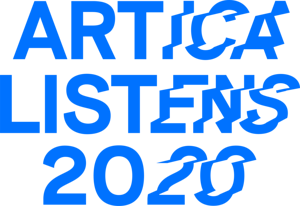The Future of Svalbard
August 29, 2020, 3pm
Together with Norwegian Pen, this year Artica Listens focuses on the most urgent issues that Svalbard and its inhabitants are facing.
At a time when mining is being phased out, tourism is growing, the proportions of Norwegians living on the archipelago is declining and climate change is affecting both nature and people, we are asking ourselves the questions, where do the road go from here? What will Svalbard become, and for whom?
Art is present wherever important questions are being asked. Svalbard is such a place in our time.
In the light of the 100-year-old Svalbard Treaty we reflect on topics such as climate, tourism and migration.
What should the future of Longyearbyen and Svalbard look like? And what does it take to get there? In this part of Artica Listens 2020, we invite people to join us for a conversation at Litteraturhuset in Oslo. The event will be live streamed at https://www.articasvalbard.no/ .
Participants:
Maja Lunde is a Norwegian author. Her books are translated to more than 40 languages. She is also one of the country’s most prominent advocates for the climate cause. The novels The History of Bees (2015), The End of the Ocean (2017) and Przewalskis Horse (2019) are parts of her planned climate quartet. The fourth book will deal with the Arctic.
Zdenka Sokolickova is a research fellow of the Department of Social Anthropology, University of Oslo, conducting fieldwork in Longyearbyen. The project entitled boREALIFE: Overheating in the High Arctic, focuses on local impacts of globalisation and climate change.
Einar Øverenget is a professor in philosophy at the inland Norway University of applied Sciences. Øverenget is active in public debates and has written several books where he strives to make philosophy accessible and useful to current issues.
Hosts:
Line Nagell Ylvisåker is a trained journalist and has hosted several local book launches and debates. In May she published the documentary book “My world is melting. To live with climate change on Svalbard”.
Anne Grosvold has established herself as one of Norway’s most valued and respected journalists, for which she has received multiple awards and nominations. She worked as journalist, foreign correspondent and programme host for the Norwegian national broadcaster NRK for nearly 40 years.
Artica Listens 2020 - The Future of Svalbard is the final episode of a four-part series, watch the other episodes here: https://www.articasvalbard.no/ .
Artica Listens 2020 is supported by Fritt ord and Nordic Talks.
Artica Svalbard is an independent foundation facilitating an artist residency programme and public programme in Svalbard, supporting the development of Norwegian and international art and culture by enabling artists in all genres to create and present their art in Longyearbyen and around the Svalbard Archipelago. Artica Svalbard was founded in 2016 by the Norwegian Ministry of Culture, Fritt Ord (the Freedom of Expression Foundation) and the Cultural Business Development Foundation of the bank SpareBank1 Nord-Norge. Artica’s Key Partners are Norwegian PEN, Office for Contemporary Art Norway (OCA), and the Queen Sonja Print Award (QSPA).
Norwegian PEN, which was founded in 1922, is the Norwegian division of PEN International, the world’s largest organisation dedicated to promoting the rights of writers and freedom of expression. Norwegian PEN focuses on activities related to freedom of expression, and it strives to increase public awareness of the value of free debate and free expression, nationally and internationally. The organisation helps writers, journalists and publishers in countries where freedom of speech and freedom of information is under pressure, where colleagues are harassed, persecuted, monitored and imprisoned because they exercise their right to express their opinion. Norwegian PEN administers the Norwegian part of the international cities of refuge for persecuted writers. The network is run by ICORN (International Cities of Refuge Network). Today, there are 17 Norwegian cities of refuge; more than 80 persecuted writers have come to Norway as ICORN guest writers since 1995.



